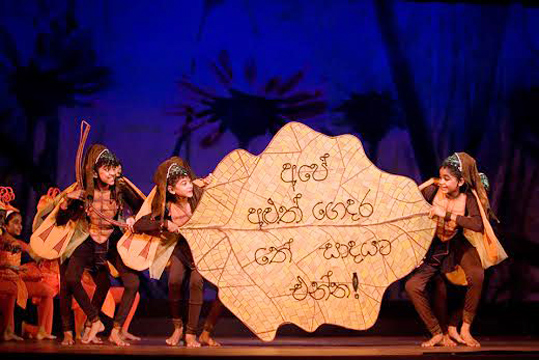|
DRAMA
The
making of Kumbi Kathawa
As told by Director Heshma Wignaraja:
by Anuradha Kodagoda
 Kumbi Kathawa (Ants’ Story), another outstanding Sinhala ballet
presented by the Chitrasena Vajira Dance Foundation, is a simple yet
powerful story expressed through mesmerizing choreography, dance, music,
costumes and lighting, reveals a confluence of art and moral values. Kumbi Kathawa (Ants’ Story), another outstanding Sinhala ballet
presented by the Chitrasena Vajira Dance Foundation, is a simple yet
powerful story expressed through mesmerizing choreography, dance, music,
costumes and lighting, reveals a confluence of art and moral values.
The story was conceived and choreographed by Anjalika Chithrasena,
the beloved daughter of legendary dancing duo Chitrasena and Vajira. She
was inspired by a Russian children's story ‘The Brave Ant’ by Tatiana
Makarova. Kumbi Kathawa is directed by Heshma Wignaraja, the
grand-daughter.
As with any production from the Chitrasena Kalayathanaya, this ballet
has been in development for over five years and has been carefully
nurtured to reach a level of excellence, in keeping with the standards
of the Kalayathanaya. It premiered in 2007 and was restaged in 2009. It
has earned rave reviews and has been dubbed a treat for Sri Lankan
theatre lovers.
Five years on, Chitrasena Kalayathanaya is back on board with Kumbi
Kathawa promising another ground-breaking performance. Here the director
of the ballet Heshma Wignaraja, tells the Sunday Observer about the
making of the Ants’ Story.
“Actually the intention for Kumbi Kathawa was derived from my mother
at a time we lived like gypsies. We didn’t have a permanent space for
rehearsals, and we were working out of one of the many places that we
used to have classes, which in this instance was my uncle’s garage.
Permanent
“For about twenty five years we did not have a school or a permanent
place to do our classes and rehearsals. Although things were not easy,
we never lost heart.
 I
think our lifestyle also backed for my mother’s story selection, because
Kumbi Kathawa is a simple story, which highlights many basic human
qualities such as strength in unity; working for the greater good of the
community; greed and the ugly actions that follow; staying positive and
not succumbing to despair; quick thinking in a crisis; and finally and
most importantly, forgiveness and compassion,” explains Heshma. I
think our lifestyle also backed for my mother’s story selection, because
Kumbi Kathawa is a simple story, which highlights many basic human
qualities such as strength in unity; working for the greater good of the
community; greed and the ugly actions that follow; staying positive and
not succumbing to despair; quick thinking in a crisis; and finally and
most importantly, forgiveness and compassion,” explains Heshma.
When Anjalika was developing her initial thoughts to create the
script of Kumbi Kathawa, Heshma was engaged in obtaining a theatre arts
degree in USA. There she got the opportunity to witness a number of
foreign productions and meet many world acclaimed theatre directors,
which further triggered her creativity. That exposure has provided lots
of inputs and influences for ‘Kumbi Kathawa’ which can actually stand
shoulder to shoulder with internationally acclaimed Disneyland
productions.
“My grandfather is the one who is responsible for initially bringing
in this mesmerizing genre called ‘ballet’ into our lives as well as to
the Sri Lankan theatre.
Although this genre has been introduced to the Sri Lankan theatre
over five, six decades ago, still very few have explored it seriously.
“Although often we see short dance items performed in different kinds of
environments and many erroneously call them ‘ballet’, it is actually not
ballet. Dance drama or ballet is actually like writing a script. It is a
huge time commitment to make it a reality. It is not only having script,
but dealing with bodies. And having bodies represent every part of the
dance drama is a very difficult process.
Single
“Many people are not involved with this genre of art because they
don’t want to spend much time on a single production. However, we are
hundred percent committed to what we are doing in Chitrasena
Kalayathanaya and we are quite serious about it,” Heshma elaborates,
adding that there are around 60 students between age seven and late
twenties taking part in Kumbi Kathawa.
To manage a large group of children on stage is no easy task but at
the Chithrasena Kalayathanaya, (located in Narahenpita, next to the
Lanka Hospitals, on land gifted by former President Chandrika
Bandaranaike Kumaratunga) it is a dedicated task, that hones talent and
instills commitment, pride of performance and discipline in kids who can
often be wayward and mischievous.
“So far Kumbi Kathawa is performed by the talents made from
Chithrasena Kalayathanaya. However, we cannot fabricate talent. Our
output completely depends on the hard work of these kids. It is true
that we identify the talents and foster them. But without their
commitment and dedication we could not achieve this much of success,”
Heshma says, explaining that they are very keen on discipline and
dancing is something sacred to them.
“We highlight the importance of our culture to our students. There
are sometimes parents asking us at the very first class of the child
when she or he is going to perform on stage? There were instances where
we have rejected the applications when parents look for instant
results,” she says, emphasising that they don’t promote any sort of
dance competitions and that it is a school rule that nobody can take
part in any dance competition without prior permission. “This is why we
are different and we are not ready to compromise our values,” Heshma
says with conviction.
Problem
Focusing on the present situation of local ballet, she says the main
problem is the financial constraints, which they also face all the time.
“This is the biggest production we have ever done. For the four days of
performance it cost Rs. 2 million, and so far we could find sponsors
only for a quarter of the budget. And some sponsors have not confirmed
yet.”
However, she says they have never done a production merely because
somebody was paying for their work. “We always find the appropriate time
that company has to do something and also the company is ready in terms
of money matters. In the meantime if a sponsor pops up we are lucky!
Unlike in my grandparents’ time, today there’re very few patrons for the
arts. That is one major problem that we have like all the other artistes
especially in the theatre," she points out.
Kumbi Kathawa is a production by children for children. There’s no
doubt that this time too, it is going to be another magical evening of
dance theatre the same as previous times.
Kumbi Kathawa the story
The ballet opens in an ant colony, where different ant families are
at work, completing their specialized tasks (cooking, cleaning, washing
clothes etc) for the good of the whole community. One day, however, the
main ant family leaves the colony to gather food.
In their absence, an evil force, a mosquito, arrives and decides she
wants to take over the beautiful place where the ants live. She
terrorizes the ants, chases them away, and then destroys their home.
When the lead ant family return after gathering food, they find their
home destroyed and their friends missing. The mosquito shows no sympathy
to their plight, and proceeds to chase them away as well.
Homeless and alone, the main ant family do not despair. They come
across an old tin and decide to make it their home.
In order to celebrate their new beginning, and to make new friends,
they host a tea party and invite a number of different insects
(grasshoppers, fireflies, ladybirds, butterflies) to their new home.
During the tea party, a storm strikes and suddenly a flood surrounds
them.
The winged insects take off, but those who can’t fly are left behind.
The quick-thinking ants are able to topple their tin to make it float,
and then start helping other insects who have been caught in the flood.
They are even able to rescue the evil mosquito that had previously
terrorized their world. |

